The Royal Naval Division at Passchendaele 1917
- Home
- World War I Articles
- The Royal Naval Division at Passchendaele 1917
The Royal Naval Division at Passchendaele 1917
The following account is a short extract from the 7 part memoirs of Leading Seaman Thomas MacMillan of the Benbow Battalion, Royal Naval Division His full story can be found in the new 'R.N.D. Journals section' of the members-only pages of The WFA website. Produced by Len Sellers between 1997 and 2003, these comprise 24 issues, containing 2,443 pages with 581 photographs, 75 maps and 71 poems, and are just part of a vast collection that is now available to WFA members in our aim to provide further quality material.
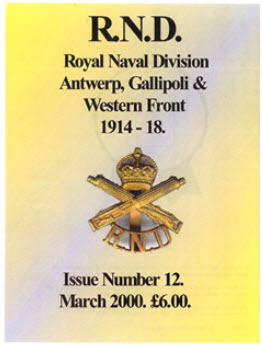
---------------------------------------------------
"The weather was of the vilest description when we moved forward to the Ypres Salient and fixed our headquarters at Dirty Bucket Corner. A more appropriate name could not have been found for the place. There was mud to the right of us, mud to the left of us, with mud and slush as far as the eye could see. The whole countryside had been marred in an abominable way by our own shells and by an enemy who delighted in frightfulness. The captured documents sent to us for perusal were so seldom without the word "annihilate" that one might have imagined the Germans considered this term synonymous with "damnation" and the hellish Salient, the Valley of the Shadow which they had prepared for us.
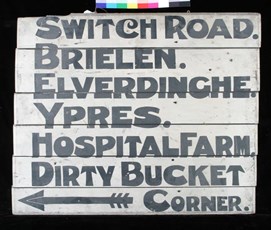
However, no one at Brigade Headquarters' Staff found much time to brood over his unpleasant surroundings, for all were kept busy preparing for the operations which soon would engage their attention. Day in, day out, from early morning till late at night, I was employed preparing orders and distributing maps.
The enemy artillery had not located us, but monster Gothas circled overhead and straddled the ground with heavy bombs. On the nights when sleep was not overpowering I lay awake listening to the confusion which their bombing created. I could hear the tooting of motor horns, the shouts of drivers of limber wagons and the patter of their horses' hoofs in their wild scamper to clear the Menin Road, which was the principal objective of the air attacks. What between bombs and shells and gas, this road must have been the most perilous highway in any of the theatres of the war. When all were ready for action we moved forward to the banks of the Yser Canal where the new General found us. He bore an illustrious name [Brig General J.F.S. Coleridge] and looked capable, but I had the feeling that he would be a stickler for discipline. That the Major held the same opinion I was convinced by the caution he observed in the General's presence, and by a new-found humility.
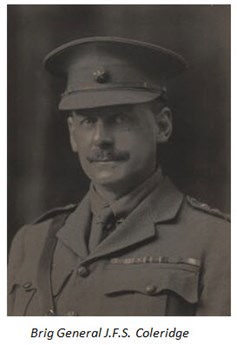
After wallowing on the mud banks of the Yser for some days the Major called me and began to dictate a movement order which, when he had completed, he requested me to read to the General. I found him in an elephant shelter and informed him the reason for my visit. He smiled and settled to hear the contents of the order. When I had finished reading he dismissed me with a genial, "That will do," and I hurried off to inform the Major that his order had passed the new censor without correction. The news brightened him up, and when I saw that he had lost a little of his self-confidence I remarked that he had nothing to fear from the new Brigadier. He flushed at my divination and with a hypersensitive smile asked; "Why ?" I did not reply but looked at him steadfastly in a manner which must have conveyed to him more eloquently than any words of mine could have done, that the ripened soldier I had left would lean as heavily on his unprofessional Brigade-Major as the previous General had done. From that moment the Major was on his toes again.
On receipt of advice that all units were in battle position, the General, the Major and myself left to take up quarters in a captured pill-box called Hubner Farm. The afternoon was well advanced when we arrived at a point on the Menin Road where a runner was posted, whose duty it was to conduct us to the pill-box. The intervening ground from the point where we left the road to Hubner Farm presented the most God-forsaken spectacle I had seen so far or perhaps ever shall see. We had to proceed cautiously over the greasy duck-board track, on each side of which the day's casualties lay half-buried in the mud. Occasionally we halted in order to negotiate some awkward bend on the track; to have lost a footing might have meant slow and certain death from drowning in a water logged shell hole. The clayey soil had been pulped by the enemy's artillery, while continuous rain had transformed every shell hole into a muddy pool. Succeeding salvos had enlarged the shell holes, and in one of the largest of them I discovered all that remained of a battery of our Field Artillery. Men and horses half-submerged eyed us with a glassy stare and the brown water ran red with their blood.
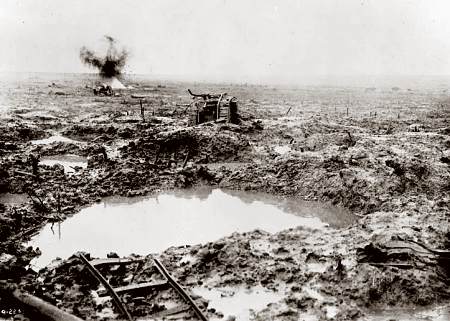
On reaching our destination I had to return to the Menin Road with a working party to bring up office stores, which included a typewriter. I had been told that typewriting and duplicating would be out of the question in a pill-box, and that we would require to rely on pencils and carbons. But to this I replied that pencils and carbons were of little use to me, and that I must get a machine up by hook or by crook. It was a job ! On the return trip, "Jerry" introduced his evening strafe by spraying our duck-board track with light gas shells. To use respirators was unthinkable, for we needed all our wits and wind to keep the box which contained the typewriter from skidding off the slippery track into the mud.
By great good luck we missed a direct hit, while the shells which fell close were rendered harmless by the soft nature of the ground which did not offer resistance sufficient to cause them to explode. The shelling, however, forced us to proceed on our hands and knees most of the way, and when I arrived at Hubner Farn, I was as filthy as any of the great unwashed. My mortification was complete on being informed that so long as I remained at Hubner Farm there might be sufficient water to keep thirst at bay, but there certainly would not be sufficient for a wash.
Now the pill-boxes were funny things; they were made of reinforced concrete and were very strong. Just why they were called pill-boxes I was never able to ascertain but I fancy that some wit on first seeing them thought that they most resembled boxes for pills. The invention was quite a happy one, for the term "strong-point" or "redoubt" did not quite meet the case. I should like to add, however, that in shape they bore no resemblance whatever to the pillboxes used by the manufacturers of pills who flourish in my neighbourhood.
Hubner Farm, for instance, was oblong, with a frontage of about 30 feet and sides about 60 feet in length. It had two compartments - one forward and one in the rear - which were joined by a side corridor high enough to permit the tallest person to walk without stooping. There was only one entrance, which was placed on the left side and was protected from the encroaching mud by substantial walls of concrete about six feet high and ten feet long. The forward compartment was where the damage was done. Here slits were made for machine guns to function on a field of fire which connected with a field of fire of the pill-boxes on the right and left so that all fire was coordinated and all pill-boxes mutually supporting. The rear compartment was used for the storage of ammunition and food, and for the housing of reserve crews or assault troops. Necessity is credited with being the mother of invention and in this case she played her part well, for no more formidable obstacles could have been conceived.
There were over forty of our men in Huber Farm when I arrived. I found the place packed out with battalion runners, who had now became mates on account of the increased dangers and difficulties they had to face. A portion of the rear compartment had been allocated to me, and I was busy getting all my gear together when a gas alarm was raised. In order that I might have freedom to work I had left my gas mask outside the pillbox, and as the excitement was high when the warning was given, I had to fight my way out for it without drawing a breath. The alarm was either false or the gas miscarried, for after sitting like mummies for half an hour someone announced that all was clear.
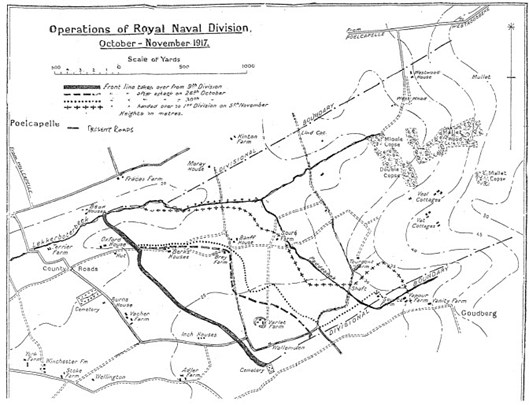
During the four days I spent at Hubner Farm we had on the average two gas alarms per day. I found them most unsettling and prodigal of time. But what troubled me most of all was the heavy shelling, and the occasional direct hit, which usually put me on my back, with the typewriter and the two biscuit boxes, which supported it, on top of me. This happened too often for my liking and I had to request the Major to find a place for me in his compartment where a direct hit was less likely since, after capture, positions were reversed. My request was granted and I got the peace to produce the orders which unfortunately sent so many fine fellows to their doom. These orders were for the taking of the town of Passchendaele. We as a brigade were concerned only in having the Hood Battalion as counter-attacking battalion with the Hawke Battalion in Brigade Reserve to the 188th and 190th Brigades who were to do the main fighting on the left of the Canadians as they advanced to take the town.
At 5.40 am on the morning of October 26th 1917 the muddiest and bloodiest of fights began. The first objective was a line conforming to the Paddebeek stream, and about 100 yards west of it and the second a line parallel to the first objective and five hundred yards ahead. As the fight raged I collected the reports brought by battalion runners. From them I learned that withering machine gun fire was thinning our ranks, and that the pitiless mud was claiming many victims. To add to the horror of it all, the enemy were using gas shells with devilish liberality. Almost all the senior officers of the for attacking battalions had become casualties. Some were blinded by mustered [sic] gas, while others were hit and rolled into shell holes where they were drowned.
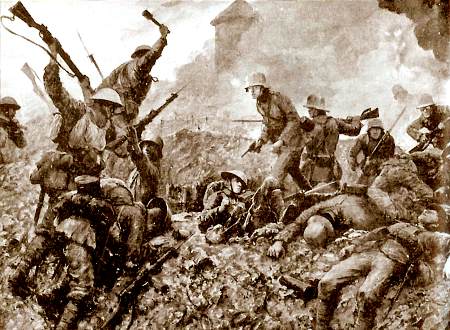
The four battalions were getting out of hand when Commander Asquith advanced with his battalion and saved the situation. He placed the "Hoods" in the most advantageous position to meet any counter-attacks which might develop, and in the teeth of heavy artillery and machine gun fire, he passed from end to end of the line we were holding and superintended the consolidation of our gains. In addition he established connection with the Canadians on our right, thus closing a breach which might have caused them infinite trouble and perhaps been the source of their undoing.
Later, when it was decided to lay down an intensive and prolonged artillery bombardment on a line of pill-boxes, Asquith intervened, maintaining that well-trained, fresh and lightly equipped troops familiar with the ground could take the pill-boxes with comparative ease. His policy was to surround them silently by night and bomb them into submission; there might be instances, he thought, where a concentrated preliminary bombardment would be necessary. Strange to relate, his scheme received official recognition and, when put to the test, proved a big success.
We had paid dearly for all that was achieved, but it was consoling to feel that our sacrifice had not been in vain. The hardest knock that came our way was that which took Commander Sterndale Bennett from us for ever. A shell with his number on it early found the hero out, although mortally wounded, he instructed the stretcher bearers to halt at Hubner Farm so that he might take farewell of Barnett and report the state of affairs ahead".





